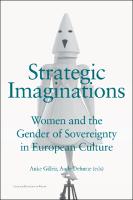Strategic Imaginations
Women and the Gender of Sovereignty in European Culture
| dc.contributor.editor | Gilleir, Anke | |
| dc.contributor.editor | Defurne, Aude | |
| dc.date.accessioned | 2020-12-02T09:34:07Z | |
| dc.date.available | 2020-12-02T09:34:07Z | |
| dc.date.issued | 2020 | |
| dc.identifier | OCN: 1196818705 | |
| dc.identifier.isbn | 9789461663511 | en_US |
| dc.identifier.isbn | 9789462702479 | en_US |
| dc.identifier.uri | https://library.oapen.org/handle/20.500.12657/43135 | |
| dc.description.abstract | What is the gender of political power ? What happens to the history of sovereignty when we reconsider it from a gender perspective ? Political sovereignty has been a major theme in European thought from the very beginning of intellectual reflection on community. Philosophy and political theory, historiography, theology, and literature and the arts have, often in dialogue with one another, sought to represent or recalibrate notions of rule. Yet whatever covenant was imagined, sovereign rule has consistently been figured as a male prerogative While in-depth studies of historical women rulers have proliferated in the past decades, these have not systematically explored how all women rulers throughout the entirety of European culture have had to operate in a context that could not think power as female – except in grotesque terms. Strategic Imaginations demonstrates that this constitutive tension can only be brought out by studying women’s political rule in a comparative and longue durée manner. The book offers a collection of essays that brings together studies of female sovereignty from the Polish-Lithuanian to the British Commonwealth, and from the Middle Ages to the genesis of modern democracy. It addresses historical figures and takes stock of the rich yet unsettling imagination of female rule in philosophy, literature and art history. For all the variety of geographical, social, and historical contexts it engages, the book reveals surprising resonances between the strategies women rulers used and the images and practices they adopted in the context of an all-pervasive skepticism toward female rule. | en_US |
| dc.language | English | en_US |
| dc.subject.classification | thema EDItEUR::J Society and Social Sciences::JB Society and culture: general::JBS Social groups, communities and identities::JBSF Gender studies, gender groups::JBSF1 Gender studies: women and girls | en_US |
| dc.subject.classification | thema EDItEUR::N History and Archaeology::NH History::NHD European history | en_US |
| dc.subject.classification | thema EDItEUR::N History and Archaeology::NH History::NHT History: specific events and topics::NHTB Social and cultural history | en_US |
| dc.subject.classification | thema EDItEUR::J Society and Social Sciences::JP Politics and government | en_US |
| dc.subject.classification | thema EDItEUR::D Biography, Literature and Literary studies::DS Literature: history and criticism::DSB Literary studies: general::DSBF Literary studies: c 1800 to c 1900 | en_US |
| dc.subject.classification | thema EDItEUR::D Biography, Literature and Literary studies::DS Literature: history and criticism::DSB Literary studies: general::DSBH Literary studies: c 1900 to c 2000 | en_US |
| dc.subject.classification | thema EDItEUR::D Biography, Literature and Literary studies::DS Literature: history and criticism::DSB Literary studies: general | en_US |
| dc.subject.other | gender | en_US |
| dc.subject.other | political history | en_US |
| dc.subject.other | cultural history | en_US |
| dc.subject.other | literature | en_US |
| dc.subject.other | art history | en_US |
| dc.title | Strategic Imaginations | en_US |
| dc.title.alternative | Women and the Gender of Sovereignty in European Culture | en_US |
| dc.type | book | |
| oapen.identifier.doi | 10.11116/9789461663504 | en_US |
| oapen.relation.isPublishedBy | 91436d3b-fb9a-45e9-8a57-08708b92dcda | en_US |
| oapen.relation.isFundedBy | 608fbdcb-bd0a-4d50-9a26-902224692f76 | en_US |
| oapen.pages | 310 | en_US |
| oapen.place.publication | Leuven | en_US |
| oapen.remark.public | Funder name: KU Leuven Fund for Fair Open Access |

